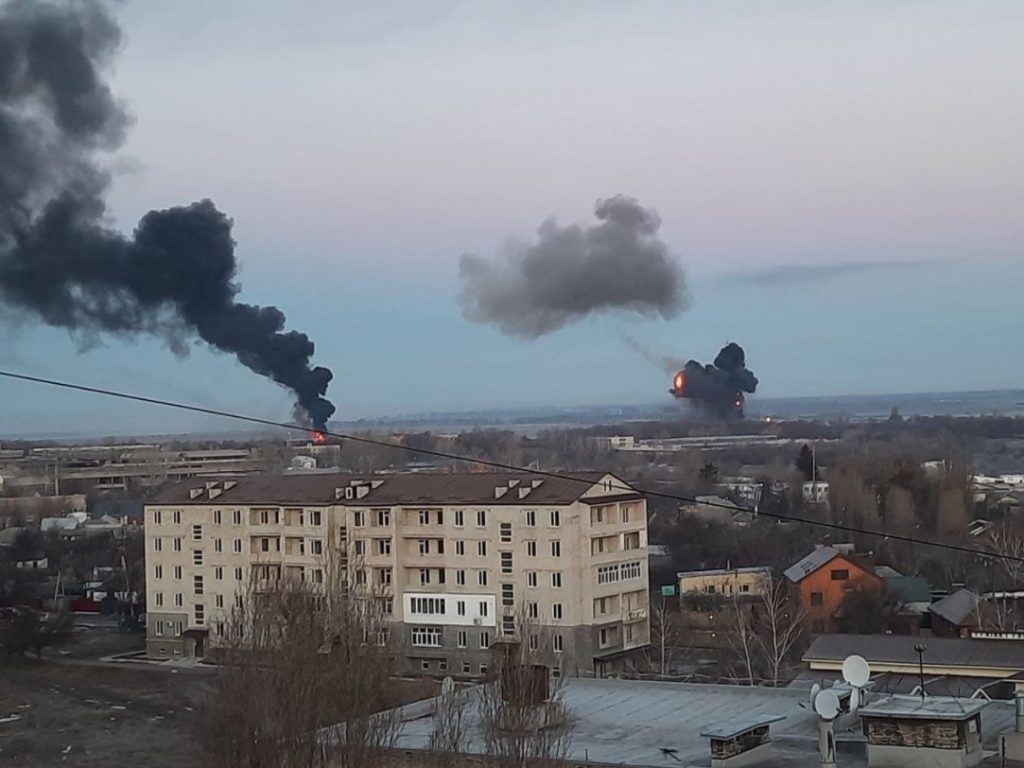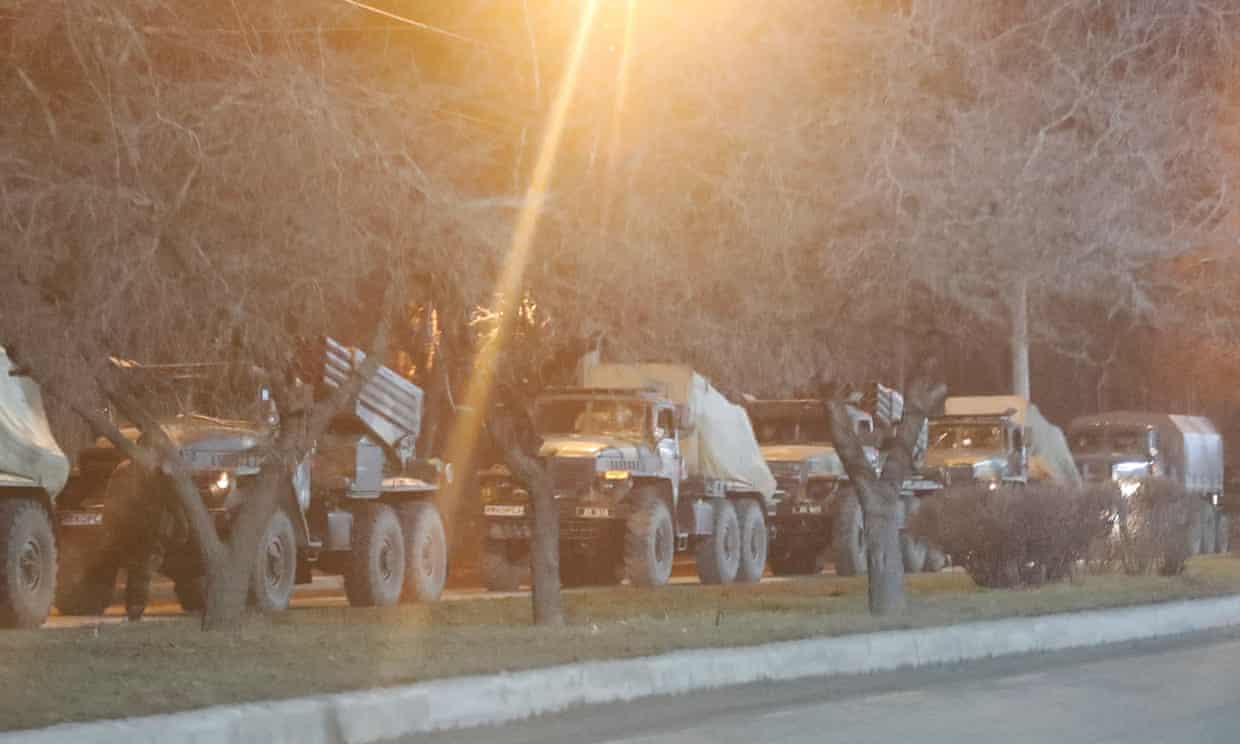Owing to time zone differences, please note that at the time of writing this article, it is 24 February, at 2pm (GMT +08:00).
Just three hours ago, Russian President Vladimir Putin announced that he will be carrying out a “special military operation” in Ukraine.

In his publicly broadcasted address that lasted for 43 minutes, he stated that the conflict between Ukraine and Russia was “inevitable” and “only a question of time”.
Appeals for Help from the Donbas Region
He justified the military operation by claiming that he had received appeals for assistance from the Donetsk People’s Republic and Luhansk People’s Republic, two Eastern regions that broke away from Ukraine under the witness of President Putin on 21 February 2022.
“Circumstances require us to take decisive and immediate action,” President Putin said.
His goal in carrying out the military occupation “is to protect people who have been subjected to abuse, genocide by the Kyiv regime for eight years”, and in order to achieve it, Russia will strive to demilitarise Ukraine.
Mr Putin even goes as far as describing Kyiv’s current government a Nazi regime, who have “committed numerous bloody crimes against peaceful residents, including the citizens of the Russian Federation”.
Then, he reiterates that Moscow’s agenda isn’t to occupy Ukraine, merely to disarm it.
In the same vein, he told Kyiv’s military to lay down their weapons, whilst threatening heavy retaliation against any country that dares to intervene.
Putin: NATO’s Eastward Expansion is a Threat to Russia’s Security
Another reason that Putin brought to the table is that the North Atlantic Treaty Organisation (NATO) and the United States (US) has consistently reneged on its promise to not expand eastwards, despite numerous warnings coming from Russia over the past three decades.
The aforesaid promise had happened shortly after the collapse of the Soviet Union. President Putin declares that while its old Communist regime has fallen, it was still a nuclear powerhouse and held a great deal of potential, military-wise.
Mr Putin explains that the push beyond territories into old Russia proxies—probably the Baltic states in this case—and its tightening alliance with Ukraine was the trigger that catalysed the swift escalation in the crisis, wherein the Kremlin is now pitted against the West.
He emphasised that NATO was inching too close to Russia’s borders and added that he found “NATO’s development of Ukraine” unacceptable.
Join our Telegram channel for more entertaining and informative articles at https://t.me/goodyfeedsg or download the Goody Feed app here: https://goodyfeed.com/app/
Explosions Heard in Ukraine After the Announcement
Shortly after the Russian President’s address, the Russian Air Force was deployed immediately.
And the phrase ‘shortly after’, literally means 20 minutes later, because reporters abroad in Ukraine started reporting that they were hearing ominous noses.
CNN Reporter Neil Hauer had written a quick post on Twitter, asserting that he had heard two explosions from his apartment at Khreschatyk, which didn’t stop for three minutes at least.
Two booms heard from my apartment on Khreshatyk, Kyiv in the past 3 minutes
— Neil Hauer (@NeilPHauer) February 24, 2022
Other residents have gone online, claiming that they had been awoken by the same sounds, especially in Kharkiv, where someone even managed to capture the image of a ballooning explosion from afar.
Something massive just exploded in Kharkiv pic.twitter.com/GlKY1S8VbV
— OSINTtechnical (@Osinttechnical) February 24, 2022
One Hour After Putin’s Announcement
An hour after President Putin’s announcement, Ukrainian officials confirmed that Russian troops have landed in Odessa, while others have moved into Kharkiv.
Many missile strikes appear to have happened simultaneously, starting from Odessa in the Southwest, towards the east coast of Mariupol, going through Kharkiv further north to finally land near the Ukrainian Capital of Kyiv which is on top of the crescent formation.
Shelling of Mariupol. OSINT mavens, have at it. pic.twitter.com/ErUKzaHjy1
— Michael Weiss (@michaeldweiss) February 24, 2022

Ukrainian President Volodymyr Zelenskiyy proceeds to publish a short 43-second address on the Defence of Ukraine’s Twitter, confirming that there were missiles targeting Ukrainian military infrastructure.
He advises his people to stay home and stay strong.
Звернення Президента Володимира Зеленського pic.twitter.com/oQ1bsB6Ow8
— Defence of Ukraine (@DefenceU) February 24, 2022
Seven “powerful” airstrikes had been gunning for the Vasilkovsky Airport in the peripheries of Kyiv, where Ukraine military fighter bombers were stored.
Military vehicles were also sighted on the streets in the outskirts of Donetsk by Reuters Reporter Alexander Ermochenko.

During the Emergency United Nations (UN) Security Council meeting which was the last bid to sue for peace and stop the imminent war, the topic took an abrupt shift to Russia’s UN Ambassador Vasily Bebenzya reading out his President’s statement regarding the commencement of military operations in Ukraine.
In response, Ukraine’s UN Ambassador Sergiy Kyslytsya called on Mr Nebenzya, asking for assurances from the Security Council that there wouldn’t be widespread war across Ukraine, otherwise the Russian UN Ambassador should give up his position on the Council.
“The Russian Federation ought to relinquish responsibilities of the president of the Security Council, pass these responsibilities on to a legitimate member,” Mr Kyslytsya said. “There is no purgatory for war criminals—they go straight to hell, ambassador.”
Mr Bebenzya then refuted that Moscow didn’t have any issues with the Ukrainian people, just the “junta that is in power in Kyiv”.
Not that it was ever in doubt, but Russia will not be backing down on this invasion.
Moreover, it’s unlikely any resolutions will come out of the UN Security Council meeting, since Russia has been a permanent member on the Security Council since its founding and holds veto power.
Read Also:
- Ukraine Now Declares a State of Emergency & Activating its Reserve Troops
- Russia-Ukraine War Could Increase Prices of Petrol, Electricity & Food in S’pore
- Everything About the Impending War Between Ukraine & Russia Simplified for You
Featured Image: The Guardian
